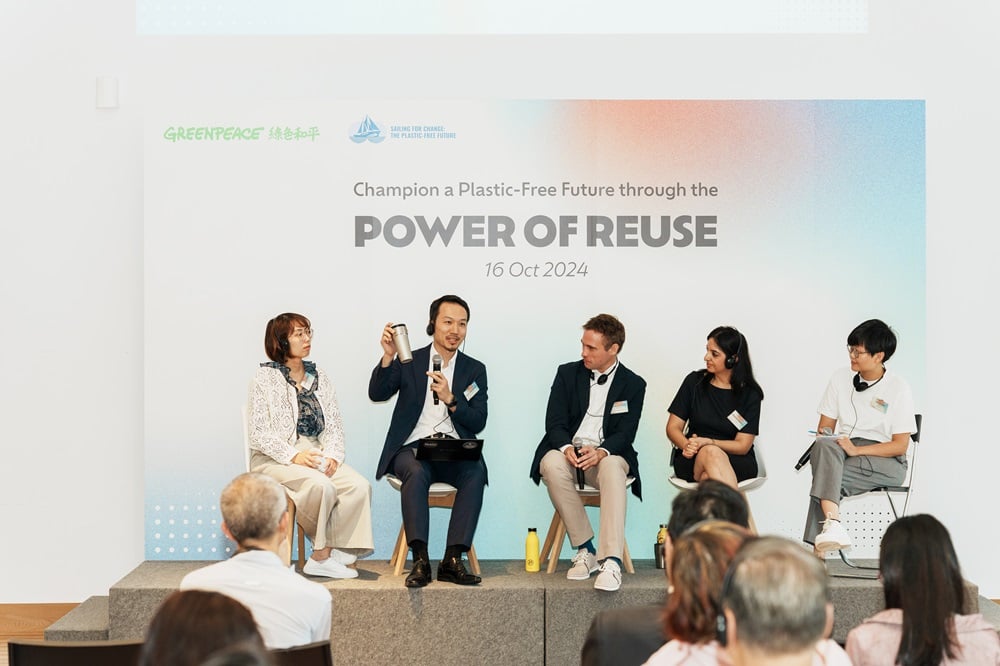19 November 2024, Seoul, South Korea: A new research by Greenpeace East Asia exposes the significant role that petrochemical industries in South Korea, Japan, and Taiwan play in fueling both plastic pollution and carbon emissions. The combined production capacity of primary plastic polymers from the three markets reaches 41.99 million tonnes annually, which is projected to create the equivalent of 99.93 megatons of carbon dioxide equivalent (CO₂e) [1] emissions.
South Korea, the host of next week’s fifth Intergovernmental Negotiating Committee (INC-5) meeting for a Global Plastics Treaty in Busan, leads with a production capacity of 19.92 million tonnes. Japan follows with 13.04 million tonnes and Taiwan with 9.02 million tonnes – collectively representing approximately 11% of global annual petrochemical production capacity. Of the plastic polymers analyzed, South Korean plastic production CO2e emissions are equivalent to those of Japan and Taiwan combined, highlighting the country’s substantial environmental footprint.
“These findings illustrate the profound environmental costs of plastic production in South Korea, Taiwan and Japan. Without immediate action to curb overproduction, we risk accelerating the climate crisis and exacerbating plastic pollution on a global scale,” said Daniel Read, Climate and Energy campaigner at Greenpeace Japan.
The report highlights how Japan, Taiwan and South Korea’s production capacity contributes to the overcapacity problem in the global petrochemical market. Of the top 10 plastic-producing companies by volume in the three markets, seven are based in South Korea. Lotte Group and Taiwan’s Formosa Plastics Group rank among the largest producers, each accounting for around 10% of the total plastic production.
The Intergovernmental Panel on Climate Change identified the petrochemical industry as one with more than 99% reliance on fossil fuels for feedstock, making it a challenge for reaching net zero emissions. To ensure alignment with the goals of the Paris Agreement, it is crucial to reduce the capacity and emissions of the petrochemical industry. However, the current state of the industry shows that this is unlikely without a strong regulatory framework. As government representatives gather in Busan for the Global Plastics Treaty negotiations, Greenpeace is calling for a strong and ambitious agreement that will cut plastic production by at least 75% by 2040 and end single-use plastics.
“The upcoming Busan plastic talks will put our planet at the crossroads. To achieve our climate goals and tackle the plastics crisis, the solution is to reduce plastic production. World leaders must show courage and deliver a treaty that protects our health, our communities, our environment,” said Nara Kim, plastics campaigner at Greenpeace Seoul.
Notes to the editor:
[1] Carbon dioxide equivalent (CO₂e) is a term for describing different greenhouse gasses in a common unit. For any quantity and type of greenhouse gas, CO2e signifies the amount of CO2 which would have the equivalent global warming impact.
East Asia Plastics and Petrochemical Production Database research briefing can be downloaded here.
Media Contacts:
Emma Kim, Communications Officer, Greenpeace South Korea
[email protected] | +82-10-8967-1909
Angelica Carballo Pago, Global Plastics Media Lead, Greenpeace USA [email protected], +63 917 112 4492

-1.jpg)

